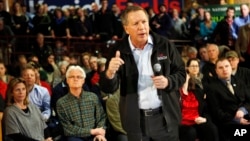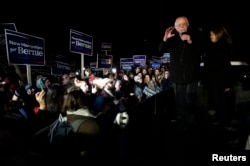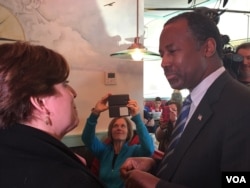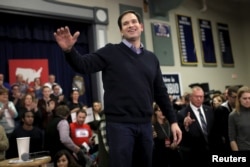As presidential candidates in both parties hold campaign events across New Hampshire before Tuesday's primary election, there has been one common theme: an appeal to independent voters.
Independents make up a large portion of New Hampshire voters. About 44 percent of the electorate here is undeclared, more than the percentage of the state’s registered Democrats and Republicans.
One of those undeclared voters is Robert Cooper. He’s leaning toward GOP candidates this time around, but he said he’s voted both Republican and Democrat in the past.
“I always want to reserve the right to make sure I vote for the best candidate, and not align myself necessarily with a party,” Cooper said. “I don’t agree with all the elements of any party’s platform.”
The image of the fiercely independent, open-minded New Hampshire voter matches up well with the northeastern state’s motto “Live Free or Die.”
Journalists frequently paint an idyllic picture of the typical New Hampshirite: self-reliant, free-thinking and ultra-informed.
Voting process
Presidential candidates respond accordingly, often tailoring their message in an attempt to lure voters across party lines. That’s an oversimplification, though, said Andrew Smith, a political science professor at the University of New Hampshire.
“It’s beyond overblown,” Smith said. “A lot of people here may be registered as undeclared, but that doesn’t mean they’re politically independent.”
As director of the well-respected UNH Survey Center, which measures public opinion in New Hampshire, Smith is in a good position to make such a statement. The center’s research shows there has been an increase in undeclared New Hampshire voters during the past 20 years, but he said it has little to do with voter temperament.
“It’s not because the state is particularly independent thinking,” he said. “It’s that they made the laws easier to stay independent.”
In New Hampshire, undeclared voters are allowed to vote in either party’s primary election. But Smith said most of the undeclared voters already have made up their minds.
“It’s only between 3 and 7 percent that are truly those kinds of people that are in a position to choose whether to pull a Republican or Democrat ballot,” he emphasized.
Disaffected voters
That group probably will have only a limited impact on the primary election, however, because many of the unaffiliated voters usually don’t vote.
That is the case for Kevin Brown, a resident of Keene, New Hampshire. Although he’s in his 50s, Brown has only voted twice in his life.
“I determined long ago that there was something fundamentally wrong with the political process,” Brown said, although this election he is voting for Vermont Senator Bernie Sanders.
Undecided independents like Brown could impact the race, said Joe Bafumi, professor of government at Dartmouth College.
“There are people who are politically inactive, but who could become politically activized by the right candidate,” Bafumi admitted. “But typically you don’t expect it to make a huge difference.”
Moderates
New Hampshire voters have a reputation for being more centrist and that appears to be accurate.
The moderate label particularly describes New Hampshire Republicans, about 45 percent of whom identify as either moderate or liberal in their political ideology.
Most Republicans here are more business-minded, putting an emphasis on fiscal rather than social issues, such as gay marriage or abortion.
The main reason New Hampshire’s conservatives are so moderate — it's the second-least religious state in the country, Smith said.
“So those issues that have sort of a religious or moral base to them don’t hold the same power they do in states that are far more religious,” he said.
As a result, many conservative presidential candidates with strong evangelical credentials often struggle here.
New Hampshire ‘picks presidents’
That marks a sharp contrast with Iowa, the Midwestern state that precedes New Hampshire in the nominating process and often chooses more fringe candidates. The differences have led to a friendly rivalry between New Hampshire and Iowa, both of which are proud of their influence on the U.S. electoral process.
Former New Hampshire Governor John Sununu put it this way: “Iowa picks corn, but New Hampshire picks presidents.”
The expression is often repeated here, but the truth may be a bit more complicated, given the fact that New Hampshire has failed to pick the last three presidents in primary elections.
“I’d say it’s more like: New Hampshire winnows the field,” Smith said. “It narrows the field down to the two or three candidates who have a credible chance of winning the nomination.”
In Photos: Campaigning in New Hampshire









